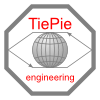/**
* OscilloscopeCombineHS3HS4.c
*
* This example demonstrates how to create and open a combined instrument of all found Handyscope HS3, Handyscope HS4 and/or Handyscope HS4 DIFF's.
*
* Find more information on https://www.tiepie.com/libtiepie-hw-sdk .
*/
#include "CheckStatus.h"
#include "PrintInfo.h"
#include "Utils.h"
#include <libtiepie-hw.h>
#include <stdio.h>
#include <stdlib.h>
int main(int argc, char* argv[])
{
int status = EXIT_SUCCESS;
// Initialize library:
tiepie_hw_init();
// Print library information:
printLibraryInfo();
// Update device list:
tiepie_hw_devicelist_update();
CHECK_LAST_STATUS();
// Allocate memory for storing device handles:
uint32_t deviceCount = tiepie_hw_devicelist_get_count();
CHECK_LAST_STATUS();
tiepie_hw_handle* deviceHandles = malloc(sizeof(tiepie_hw_handle) * deviceCount);
uint32_t deviceHandleCount = 0;
// Try to open all HS3/HS4(D) oscilloscopes:
for(uint32_t index = 0; index < deviceCount; index++)
{
const tiepie_hw_handle item = tiepie_hw_devicelist_get_item_by_index(index);
uint32_t productId = tiepie_hw_devicelistitem_get_product_id(item);
CHECK_LAST_STATUS();
if((productId == TIEPIE_HW_PRODUCTID_HS3 || productId == TIEPIE_HW_PRODUCTID_HS4 || productId == TIEPIE_HW_PRODUCTID_HS4D) &&
tiepie_hw_devicelistitem_can_open(item, TIEPIE_HW_DEVICETYPE_OSCILLOSCOPE))
{
tiepie_hw_handle scp = tiepie_hw_devicelistitem_open_oscilloscope(item);
CHECK_LAST_STATUS();
if(scp != TIEPIE_HW_HANDLE_INVALID)
{
// Get name:
uint32_t length = tiepie_hw_device_get_name(scp, NULL, 0) + 1; // Add one for the terminating zero
CHECK_LAST_STATUS();
char* name = malloc(sizeof(char) * length);
length = tiepie_hw_device_get_name(scp, name, length);
CHECK_LAST_STATUS();
printf("Found: %s, s/n: %u\n", name, tiepie_hw_device_get_serial_number(scp));
CHECK_LAST_STATUS();
free(name);
deviceHandles[deviceHandleCount] = scp;
deviceHandleCount++;
}
}
tiepie_hw_object_close(item);
}
if(deviceHandleCount > 1)
{
// Create and open combined instrument:
tiepie_hw_handle scp = tiepie_hw_devicelist_create_and_open_combined_device(deviceHandles, deviceHandleCount);
CHECK_LAST_STATUS();
// Release HS3/HS4(D) handles, not required anymore:
for(uint32_t i = 0; i < deviceHandleCount; i++)
{
tiepie_hw_object_close(deviceHandles[i]);
CHECK_LAST_STATUS();
}
free(deviceHandles);
deviceHandles = NULL;
// Print combined oscilloscope info:
printDeviceInfo(scp);
// Get serial number, required for removing:
uint32_t serialNumber = tiepie_hw_device_get_serial_number(scp);
CHECK_LAST_STATUS();
// Close combined oscilloscope:
tiepie_hw_object_close(scp);
CHECK_LAST_STATUS();
// Remove combined oscilloscope from the device list:
tiepie_hw_devicelist_remove_device(serialNumber, TIEPIE_HW_BOOL_FALSE);
CHECK_LAST_STATUS();
}
else
{
fprintf(stderr, "Not enough HS3/HS4(D)\'s found, at least two required!\n");
status = EXIT_FAILURE;
}
// Release HS3/HS4(D) handles:
if(deviceHandles)
{
for(uint32_t i = 0; i < deviceHandleCount; i++)
{
tiepie_hw_object_close(deviceHandles[i]);
}
free(deviceHandles);
}
// Exit library:
tiepie_hw_fini();
return status;
}
